Roz Savage's Blog, page 31
October 23, 2013
Adventure Podcast #8: Daniel Fox, Photographer, Storyteller And Much More
This week I enjoy a wide-ranging, often philosophical, conversation with Daniel Fox, photographer, storyteller, filmmaker, kayaker, scuba diver, horseback rider & founder of the Wild Image Project.
Daniel is based in San Francisco, but travels all over the world in search of images that challenge people to reconsider their relationship with nature.
To subscribe to the show via RSS or iTunes, please click on the appropriate button below.
Show Notes
2:00 Daniel’s many roles – which is most important to him?
3:00 The Curious Explorer – what does it mean to be an explorer today?
4:40 The Wild Image Project
5:45 Is Daniel an environmentalist?
7:10 The art of persuasion: “You can’t force people to do what they don’t want to do. Everyone has to experience their own motivation to change.”
8:45 The need to create a physical connection between our lifestyle and its consequences
10:58 A year in the life, including Hawaii and Alaska
13:50 Hawaiian lava flows, as an example of Daniel’s art and philosophy: “Time is the only thing that nature has. It has all the time in the world… and yet time for us (humans) is the enemy… As a species we still haven’t found our place in the universe. We think of ourselves as so godlike and yet we are still so mortal.”
17:30 Ego and survival
19:10 Photography: what kit does Daniel use? And why you don’t need fancy gear to take good photos
23:15 Daniel’s photography aesthetic
26:15 What does Daniel want people to take away from his work?
27:50 Environmental optimism
29:42 Advice to budding photographers
33:40 How to stay in touch with Daniel
Do You See?
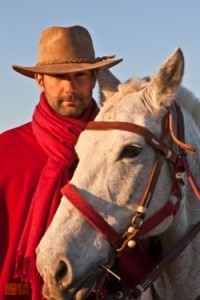
Daniel Fox
Everything in life is about perspective. We see the things that we want to see. (Daniel Fox)
According to a book I am reading at the moment (E-Squared , by Pam Grout), the brain receives a staggering 400 billion pieces of information every second – from our five senses, from inside our own bodies, and who knows, maybe even through other senses as well.
, by Pam Grout), the brain receives a staggering 400 billion pieces of information every second – from our five senses, from inside our own bodies, and who knows, maybe even through other senses as well.
Our brains have amazing capacity (yes, even the brain of your dimmest co-worker), but even they cannot consciously process all that information. So we filter. We filter dramatically, down to about 2,000 pieces of information per second. That might still sound like a lot, but it’s only one-half of one-millionth of a percent of what first arrived. John Maunsell, a neuroscientist at Harvard (also quoted in E Squared) says, “People imagine they’re seeing what’s really there, but they’re not”.
How do we select what gets through the filter, and what doesn’t? Mostly, we are heavily biased towards information that reinforces our existing worldview, i.e. that makes us feel relatively secure and comfortable, and we filter out information that challenges us to think in new ways. That’s too much like hard work. And sometimes it’s not even that sophisticated – our perceptions are just plain unreliable.
For example, think of someone you know (maybe even yourself) who is vehemently in belief or in denial of climate change. When you see an article that presents the opposing point of view, what is your attitude as you read it? Open-minded, or skeptical? Even if the case presented was compelling, could it change your mind?
Or have you read about the notorious unreliability of eyewitnesses to crimes?
If you want to test your own reliability as an observer, try this test.
And for an amusing look at how people fail to notice the obvious, try this video: (I can’t watch this video here in the UK, but I post the link here just in case you can watch it where you are – and I hope I got the right one!)
And, of course, please check out Daniel’s fine art photographs, and see if they prompt you to see the world around you through different eyes.
I hope that by now your perception of the world might be subtly different, that you might be at least open to the possibility that everything you see might not be everything there is.
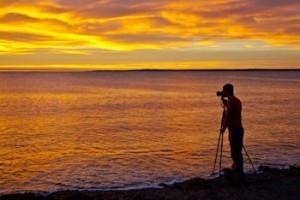
Daniel at work
I’m going to try an exercise for the next 24 hours, and I invite you to join me. Try to see something that you haven’t seen before. I don’t mean you should literally go out of your way to find something new – in fact, this experiment will work better if you don’t. Just try to notice something in your same old familiar surroundings that you haven’t seen before. Maybe look closer, to see something small. Or look at the bigger picture. Or look higher, or lower, or inside.
Please post a comment and tell me what you see.
And as we do this experiment, I hope it reminds us that everything we see is NOT all there is, that there are always new worlds waiting to be discovered, even right underneath our noses.
Links:
October 16, 2013
Adventure Podcast #7: Tom Allen, Adventure Cyclist and Filmmaker
Tom Allen is an adventure cyclist, blogger, author, filmmaker and website designer, who has been busy this year promoting his award-winning film, Janapar. Since setting out on his life of adventure, he has cycled to over 40 countries on 4 continents, spending months at a time on the road, meeting hundreds of other cycle travellers in the process. He has no fixed abode, although he has bases of sorts in England and Armenia.
I was introduced to Tom by our mutual acquaintance and Adventure Podcast alumnus, Alastair Humphreys, when I needed a new website designer. Since then have crossed paths with Tom a number of times including events at the Royal Geographical Society at the Adventure Travel Show.
To subscribe to the show via RSS or iTunes, please click on the appropriate button below.
Show Notes
1:00 Tom talks about the real life story behind Janapar
2:45 Planning the big bike trip
4:00 Ego and adventure
6:45 What holds us back from adventure?
9:00 How to cycle round the world in 3 easy step
11:00 The making of the movie Janapar and the importance of capturing the awkward moments
13:00 “You are being tested to your limits and as a result of that you’re going to learn something about yourself”
16:10 The challenges of filming your own adventure
17:20 Making the commitment to filming and to honestly sharing the inner story
21:00 Hero or Everyman?
22:35 A day in the life of Tom
23:50 Upcoming projects
25:20 Would Tom change anything about his lifestyle?
26:50 Possessions, mostly bicycles
28:30 Tips for getting started in bicycle touring
Are You A Dreamer? Or A Doer?
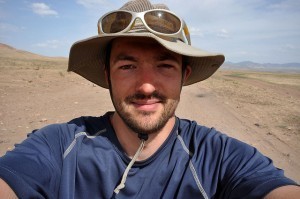
Tom Allen
If you’ve got this dream but you’re not doing it it’s because there are some blockages in there…. Just try and do one tiny thing that will alleviate one of those blockages. (Tom Allen)
When I was living on the south coast of England while I was getting ready to row the Atlantic, I seemed to end up spending a lot of time around marinas. Hard not to, really – on the south coast it seemed like just about everybody was a sailor and had stories to tell and advice to offer.
I noticed that every marina seemed to have at least one resident “dreamer” – someone who had pronounced a plan for a major voyage, and was busy finessing every last detail of their craft in readiness for this epic adventure. In some cases this process had been going on for many years, and still the dreamer seemed no nearer to making the dream come true.
I was proud when a new friend of mine, a lifelong sailor and boat engineer, pronounced his view that I was not just dreaming of rowing the world’s oceans, but that I would actually make it happen. That vote of confidence became a self-fulfilling prophecy.
So what makes the difference between the dreamer and the doer?
There are many possible answers to this, but in my view the single biggest difference is that the doer casts off the lines and sails out of the port.
The reasons why they are able to do that are many and varied – self-confidence, commitment, curiosity, a sense of adventure, a desire to leave something behind, a desire to go somewhere new – even a vote of confidence from a respected friend – but still the crucial difference is that the doer starts the doing, while the dreamer stays forever trapped in dreaming.
What are you – a dreamer or a doer?
So throw off the bowlines. Sail away from the safe harbor. Catch the trade winds in your sails. Explore. Dream. Discover. (Mark Twain)
A ship in port is safe, but that’s not what ships are built for. (Grace Murray Hopper)
Links:
How to cycle around the world in 3 easy steps
Janapar – the film and book
Advice and planning on bike trips, tips on filmmaking etc
October 14, 2013
Extending Your Comfort Zone
“Life begins at the end of your comfort zone.” (Neale Donald Walsch)
This is how I visualize my comfort zone – it’s like a big bubble with clear and elastic walls, shining with the shades of the rainbow. I’m inside the bubble, and I know that if I don’t keep moving around and pushing on its walls, it will start to collapse inwards, until eventually it is wrapped around me like plastic wrap, clinging tightly to me so I can’t move, stifling me.
But if I keep moving and pushing on those walls, I can actually make the bubble of my comfort zone bigger and bigger, expanding it until I can go anywhere and do almost anything, all within my comfort zone.
The danger is that if I push too hard and too far on a single point in the wall, I might burst the bubble and then we’re in a horrible mess. So the goal is to keep pushing, but not pushing so far that it bursts. And also to realize that an expanded comfort zone has to be maintained, that it is never static, that it is always either expanding or contracting, but never staying the same.
Of course, there’s nothing intrinsically wrong with having a small comfort zone, if all you want to do is live a small life. No problem if you want to have your daily routine and your safe parameters and not venture beyond your bubble to try something new. Genuinely, that’s fine, so long as it makes you happy.
But if you’re reading this blog, I suspect that you want something more, and maybe you’re tired of being constrained by your fears and you want to expand your horizons. Maybe you sense that the size of your bubble does not match the size of your aspirations.

Does the size of your bubble match the size of your aspirations?
So try this: make a list of things you’d like to do but at the moment they’re outside your comfort zone. Then put them in order of least scary to most scary. Look at the first one on your re-ordered list, the least scary one. Is it still too scary?
If it is, don’t panic. The objective here is NOT to scare you so much that you retreat into the cozy core of your comfort zone, never to emerge again. There are relatively unscary ways to get this started.
Think hard to find an interim step (or several) that will bridge the gap between what you feel comfortable with, and the thing that scares you.
Start with something that takes you just a little bit outside your comfort zone, and work outwards and upwards, towards your goal. At each stage congratulate yourself on a job well done, and feel the glow of satisfaction that comes from having set yourself a challenge and rising to the occasion, of stepping outside your comfort zone and not shrinking from the task. Celebrate your successes.
Be warned – it becomes addictive. You’ll start enjoying the thrill of the challenge. You will become unstoppable. Sound good to you?!
To start expanding your comfort zone, why not try a few #microadventures?
October 10, 2013
Adventure Podcast #6: Dave Cornthwaite, The Man Who Says Yes More
Dave Cornthwaite is probably the most adventurous adventurer we’ve had on the show so far, in terms of sheer diversity of physical challenges. His Expedition 1000 series involves 25 expeditions of at least 1,000 miles each, and so far has involved skateboarding, swimming, sailing, tandeming, kayaking, stand up paddling, and Eliptigoing. And the Aquaskipper – see link below to find out what that is.
After abandoning a career as a graphic artist to pursue a life of adventure, Dave now holds five world records, has written three books (so far, with more to come), works regularly as a motivational speaker, and has coined the motto Say Yes More, which absolutely sums up his philosophy of life.
To subscribe to the show via RSS or iTunes, please click on the appropriate button below.
Show Notes
2:20 Say Yes More and swimming the Missouri River
5:20 Does Dave ever say no?
6:20 Can adventuring be financially sustainable? Why adventurers are happier and spend less
8:50 Expedition 1000 – what next? Who knows?!
9:45 Keeping it simple – and cheap
10:50 What are the essential ingredients of adventure? And the kindness of strangers
13:30 The joy of being a non-commuter
15:40 Dave’s favourite adventures so far – SUPing the Mississippi and bikecaring fom Memphis to Miami – nearly dying just 4 hours into the latter
19:00 Dave’s toughest adventure so far – swimming the Lower Missouri
24:45 Facing fears
26:20 Would Dave row an ocean?
28:00 Dave’s girlfriend, Emily Penn – does absence (adventure) make the heart grow fonder?
29:30 Fascination with human mindset. Changing the world starts by changing ourselves, and that will spread as we engage in that conversation.
32:00 The immediate future
32:45 50 ways to make £50 – inspiring people to have faith in their ability to make money
33:50 Running the numbers – 1,000 women in 100 days?!
36:10 Dave’s advice for people who want to live life more adventurously (includes invitation to have a beer with Dave)
Say Yes More
“It’s all about trying to get people to do more good stuff. Back in my early twenties I used to say no a lot, and therefore didn’t experience many good things. I wasn’t developing myself much. I missed out on some great opportunities.” (Dave Cornthwaite)
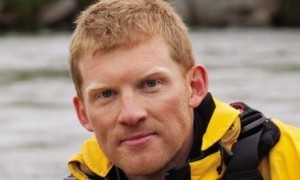
Dave Cornthwaite: the man who likes to say yes
You’ll have gathered from my chat with Dave that he now is a man who likes to say yes, game for anything, up for a challenge – much like the people whose obituaries I recalled when I was writing my fantasy obituary.
As Dave points out in our podcast, this doesn’t mean saying yes to everything (Jim Carrey in Yes Man shows how that pans out…) but, as I interpret it anyway, it means saying yes as a default, rather than the safer option of saying no.
I’m sure we can all think of occasions when we said no to something – a social invitation, a business proposition, an adventure, a date - because we were afraid or uncertain of the outcome, and didn’t want to risk failing, or looking like an idiot, or embarrassing ourselves, or losing credibility, or being hurt.
Maybe that invitation to a party that was just a bit too far away, or we were a bit too tired, or we weren’t sure if we would know anybody there. But maybe we would have met the love of our life, or a new best friend, or a new business partner.
Or a business venture, proposed by a friend, before we felt ready to go out on our own. Maybe the business would have succeeded, and set us up for life.
Or an adventure that sounded uncomfortable or strenuous, and focused on those negative aspects rather than on the amazing scenery, or the comradeship, or the sense of achievement, or even if it all went hilariously wrong, what a great story it might make in the pub afterwards.
Or the date, but we were taken by surprise, didn’t trust the person, couldn’t quite believe it was true, felt we would be punching above our weight. But it could have been for real.
Of course, our self-preserving self says to us, it MIGHT have gone right, but it could also turn out to fulfil our worst fears, in which case we did the right thing by not taking the risk. Well, good for you. You played it safe. You avoided hurt and embarrassment or wasting your time. I hope that makes you happy.
But why not try it just once? Just one teensy weensy little thing that takes you outside your comfort zone? You never know, you might enjoy it. And it DOES make a much better story in the pub than playing it safe ever will!
[If you're reading this after 11th Oct 2013, here's a link to a blog post on Extending Your Comfort Zone.]
Adventure should be 80 percent “I think this is manageable”, but it’s good to have that last 20 percent where you’re right outside your comfort zone.” (Bear Grylls)
Links
Main website, including 50 Ways to Make £50
Video for #iamyou – Do what you love and do it often. If you don’t like something, change it.
Dave’s philosophy of adventure
That Aquaskipper video
October 4, 2013
The Power of Visualisation
“A sailor without a destination cannot hope for a favorable wind.” (Leon Tec, adapted from Seneca the Younger)
I have discovered through personal experience the power of visualization. Even (or especially) if you don’t know just how you are going to get to your destination, holding a firm vision of that destination is essential.
Those of a spiritual inclination might say that when you hold a vision, you are in effect giving an instruction to the wisdom of the universe, and it would be insulting to that wisdom to tell the universe exactly how to do its job. Just release the intention into the universe and allow it to organise things for you. This is kind of what the book The Secret says, although actually I don’t think there is any big secret to it at all.
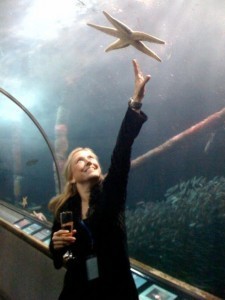
Reaching for the stars (haha) at the Aquarium of the Bay in San Francisco
I would phrase it slightly differently, and say that when you have a crystal-clear vision of where you want to be, it marshals the forces that already lie within you, in both your conscious and subconscious, so that you will recognize relevant opportunities when they arise, and will align your efforts towards that goal. The vision acts as an organising principle for your thoughts, actions, and the magical murky stuff that goes on at the subconscious level.
However you frame it, the end result is much the same. Once you have set your vision, it unleashes enormous potential in both yourself and others. The vision may not come true in the timescale you expect – in my experience it almost inevitably won’t – but if you keep the faith and hold true, you will be amazed by what emerges.
To refer back to my obituary exercise (sick of hearing about it yet?!) – when I created that vision of the adventurous, life-loving, go-getting woman that I wanted to be, I was a world away from that coming true. And yet somehow that vision seemed so real, so authentic, to me, that I recognised I had the potential to get there. I was the sort of woman who could be adventurous, life-loving, and go-getting.
After that, I didn’t have to chart every step of the way. It was a few years after the obituary exercise (the vision) that I was struck by the idea to row oceans (the project), and I saw that it would bring me closer to my vision. And so it proved. I am now firmly on track for the fantasy obituary that I defined for myself.
Create a vision.
Find a project and ask yourself if it will bring you closer to your vision.
Don’t falter, keep the faith, and although I can’t guarantee that your dreams will come true, I’ll guarantee that they won’t come true without the vision!
John Kehoe gives some good tips on how to visualise, and what it did for Arnold Schwarzenegger.
October 2, 2013
Adventure Podcast #5: Milko Van Gool, Channel Swimmer
Earlier this year I met Milko Van Gool for the first time. The 6ft 5 Dutchman was in Cork, Ireland, training for his bid to row the North Channel. A couple of years previously he had swum the English Channel in 10 hours and 22 minutes, raising $6,500 for the Centre for Injury Prevention and Research Bangladesh (CIPRB), a charity that aims to reduce the number of drowning fatalities among Bangladeshi children (currently averaging nearly 50 per day) by providing information and swimming lessons for the children of the poorest families.
Milko, who at the time worked for the European Commission in Malawi, was now preparing to swim from Ireland to Scotland to raise funds for the Chauncy Maples Malawi Trust (of which I am a patron), to refurbish a clinic ship for Lake Malawi. He and I sat and had a coffee (well, actually, he wolfed down two enormous sandwiches while I had a coffee) and compared notes on epic athletic endeavours.
A few weeks later he successfully completed the swim, along the way picking up the record for the fastest crossing by a man (Alison Streeter has swum it faster – go girl!!). I was delighted to welcome him to the Adventure Podcast to catch up on his news and find out more about what goes on in the mind of a long distance swimmer.
To subscribe to the show via RSS or iTunes, please click on the appropriate button below.
Show Notes
1:55 The accidental record-breaker – swimming from Ireland to Scotland
3:30 Handling the cold
6:00 Battling Lions Mane jellyfish
9:00 Keeping mental focus in a monotonous sport
10:20 Pain management
10:45 Training to develop resilience to fear
13:15 “Once you get into the water, you forget about your family, your friends, the only thing that counts is getting to the other side. You would rather die than give up.”
14:25 “They will have to drag me out unconscious but I will not get out myself”
15:00 Milko’s good causes
21:45 Milko’s job in Malawi, and why he takes on the tough locations
23:30 Milko’s family life, his four children and the benefits to them of a global upbringing
27:50 What next for Milko?
28:35 Diana Nyad’s achievement
30:45 Stephen Redmond’s swim from Ireland to Wales
31:50 How to get started in long distance swimming
33:45 Milko’s secret to avoiding burnout in training
The Fallacy of Future Fears
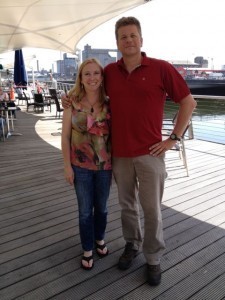
Yes, Milko is just a little bit taller than me!
“Man suffers most because of the suffering that he fears that lies in the future”
(paraphrased from the Dutch by Milko)
I was very struck by Milko’s comment that many channel swimmers are defeated, not by jellyfish, cold or currents, not even by exhaustion or pain, but by their fear of what they MIGHT experience before the end of the swim. “To fear the things that lie in wait for you is the real killer.”
Imagine that you’re swimming a channel, you’ve been going for 6 or 7 hours, well into the swim but the end is not yet in sight. The water is a bit rough, and of course you’re extremely tired, but you’ve trained hard and you’re still able to put one stroke in front of another.
But then an unwelcome thought pops into your head.
“Still another 3 hours of this. I’m tired already, so how will it feel by the end?”
You start to feel weary in anticipation of your own future weariness. Your arms and legs are still swimming but your mind is careening off into the future, worrying about just how tired you might become, wondering if you’ve got what it takes.
I experienced something like this on the Atlantic, my first ocean. (Funny how I always seem to refer back to the Atlantic in these blogs. I’m not saying nothing bad ever happened on the other voyages – just that the most intense psychological education took place during the Atlantic, and once I’d mastered certain mental skills, the problems didn’t arise to the same extent on the other oceans.)
I expended a lot of mental energy in the first half of the voyage wondering if I could do this. “Do I have what it takes to row an ocean?”
Given that I had never tried to row an ocean before, my mind had no evidence to support the theory that I could do it, and so the answer kept coming back – NO. To say that this had a negative impact on my morale would be a serious understatement.
It took me a while to figure out that the question was specious. The only way that I could find out whether I could do this was to continue doing it. Only when I either reached my destination or quit and asked for a pickup would I know whether I could do it. Until then it was all pointless speculation.
So I stopped focusing on the asking, and started instead to focus on the doing. I stopped freaking myself out by pondering imponderables, and forced myself to keep doing what it takes, i.e. slogging my way across the ocean, one oarstroke at a time.
As the great Roman rhetorician Quintillian said, “Fear of the future is worse than one’s present fortune”.
I wonder – have you got any fears that are holding you back from doing something you want to do, or caused you to abandon a goal you had set? What would have happened if you just took one more step (or swimstroke, or oarstroke) towards that goal? And another, and another, not looking any further ahead than that?
Links
The Big Row veteran champion women fundraising page
Account of Milko’s record-breaking swim from Ireland to Scotland
Videos of his crossing:
September 30, 2013
The Environment – Why Should I Care?
Most people are not interested in the environment. They’re just trying to get by, keep their job if they’re lucky enough to have one, pay the mortgage/rent, feed the family, be happy – or at least, content. How can we wake them up and engage them?
I appreciate the inherent arrogance in this question. Just because I think the environment is important, why should other people agree with me?
This question in turn begs several more questions, which deserve investigation.
First, IS the environment important?
Some people believe that we are in the end times, so we may as well burn it up and wear it out, because in a few years or decades it will all be over anyway. Here is not the place to debate the veracity of this worldview, but I’d just like to say that if there is any doubt at all as to whether it is true, we had best err on the side of caution and hang onto enough resources to last us for the foreseeable future. (More on the notion of “foreseeable” in a future blog post.)
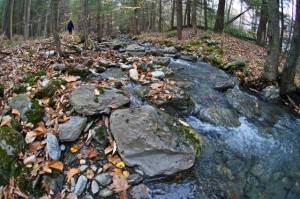
Treading lightly on the Earth
Second, why should the environment be important to ME? (ME in this context being the generic individual, not ME Roz Savage.) The impacts won’t be felt until after I am dead, and I have more than enough immediate worries, so don’t bother me with long-term hypotheticals.
Putting to one side for now questions about how long it will be before serious impacts are felt, I’d just like to challenge this mindset by asking: Where is your sense of legacy? If you believe that this generation is seriously impacting the long-term health of our species and our planet, do you not care how history will judge us? If humans of a couple of centuries ago had bequeathed to us a right old mess of indestructible trash and an impoverished biosphere, wouldn’t we feel justifiably aggrieved? Is that really how you want your grandchildren to feel about you (okay, great nieces and nephews if you don’t have children – which, environmentally, is a great idea)?
Third, nothing I do as an individual will make a difference, so why should I bother?
It is true that there are now 7.1 billion of us, and so it is easy to feel that anything we do is a tiny drop in a very big ocean. But history shows that the impact of an individual can be completely disproportionate. I’m not just talking about a great leader like Martin Luther King, Gandhi, Nelson Mandela etc. I’m talking about that person who might be the pillar of your community, or the teacher/pastor/journalist whose views you respect, but most especially the person you get talking to in the checkout line who somehow strikes a chord and makes you see things in a different way – that person who has brought their own grocery bag, or who asks if the fish has been sustainably caught, or chats to the checkout clerk about why they have chosen organic and non-GMO.
Word of mouth is the most powerful method of communication that we have at our disposal. Sure, if you stop eating fish it is not going to stop the ocean ecosystem from collapsing. But talk about it to friends, family, colleagues – not like the self-righteous loony tune that everbody avoids, but just quietly and calmly and rationally – and for the sake of your friendships, better make it briefly, too. People will take it more seriously from you than they do from the media. You’ve got the power to start changing the world – one conversation at a time.
But at the same time, we have to respect other people’s right to disagree. You never win an argument by being right. Human beings are much more complicated than that. Even if you manage to persuade someone to change their mind (congratulations!) it’s even harder to get them to change their behaviour – as the environmental movement has amply demonstrated over the last few decades.
I want to explore these issues over the coming weeks and months – how the quirks of human psychology are getting in the way of good decision-making, especially with regard to the stewardship of our Earth. I’m very open to comments, questions, and suggestions for what directions this might take. Post a comment and tell me your thoughts!
Does The Environment Matter?
Passionate though I am about environmental issues, I recognise that this feeling is not universal. If it was, our world would be a very different place. It strikes me that most people are not interested in the environment because they’re just trying to get by, keep their job if they’re lucky enough to have one, pay the mortgage/rent, feed the family, be happy – or at least, content. How can we wake them up and engage them?
I appreciate the inherent presumption in this question. Just because I think the environment is important, why should other people agree with me?
First, IS the environment important?
A shuttle bus driver once said to me, without knowing of my environmental mission, “I’m not interested in the environment”. I had to bite back the retort, “So what are you going to live in, then?” The environment is not a standalone issue, separate from us. It doesn’t just AFFECT our health, our food, the air we breathe, the water we drink. It IS all those things. We are a part of the environment, and it is a part of us. In my view, that makes it pretty important.

Photo by Roz Savage
Second, why should the environment be important to ME? (ME in this context being the generic individual, not ME Roz Savage.) “The impacts won’t be felt until after I am dead, and I have more than enough immediate worries, so don’t bother me with long-term hypotheticals.”
Putting to one side for now questions about how long it will be before serious impacts are felt, I’d just like to challenge this mindset by asking: Where is your sense of legacy? If you believe that this generation is seriously impacting the long-term health of our species and our planet, do you not care how history will judge us? If humans of a couple of centuries ago had bequeathed to us a right old mess and an impoverished biosphere, wouldn’t we feel justifiably aggrieved? Is that how you want your grandchildren to feel about you?
Third, nothing I do as an individual will make a difference, so why should I bother?
It is true that there are now 7.1 billion of us, and so it is easy to feel that anything we do is just a tiny drop in a very big ocean. But never underestimate the power of accumulation. I use the metaphor of my ocean crossings. It took me around 5 million oarstrokes (give or take) to row across 3 oceans (more stats here). Every oarstroke mattered, not because it got me very far, but because to have taken fewer oarstrokes would have left me drifting around somewhere offshore, short of my destination. Every single action counts, taken by every person, every day of their lives. It all adds up.
But of course I can’t make anybody believe something they don’t want to believe, or behave a way they don’t want to behave.
There is only one basic human right, the right to do as you damn well please. And with it comes the only basic human duty, the duty to take the consequences.
(P. J. O’Rourke)
What do you think? Does the environment matter to you? If yes, do you have any ideas how we can make it matter to more people?
September 27, 2013
Introducing the Compass
When you were doing the obituary exercise the other day (or, if you didn’t feel the need to do it, think about the last time you did some deep thinking or decision-making), did you have any sense of where your thoughts and dreams were coming from? Your head? Your heart? Maybe even outside of yourself?
Just to reassure you, there is no right or wrong answer to this question. It doesn’t matter where your ideas came from, but it’s sometimes interesting to note whether you have any sense of their origin. I like to think of there being four different origins, correlating to the four points of the compass….
North – your higher self, spirituality, dreams, flow state, interconnection with other living beings
South – groundedness, memories, past experiences, existing talents
East – left brain, logic, organization and rationality, financial concerns
West – right brain, creativity, intuition, imagination
… And that the strongest decisions arise when all four of these points are in balance.
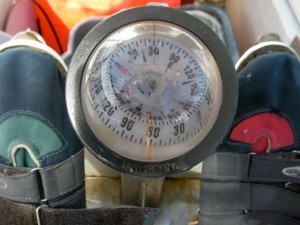
My trusty onboard compass
As an example, I’m going to use what I call my “lightbulb moment”, when it became clear to me that I was going to row across oceans to raise environmental awareness. Most of my life I had made decisions in the East, logically, rationally, often involving an Excel spreadsheet to compare the pros and cons of different options.
The lightbulb moment was a completely different creature. It popped into my head fully formed, a vision of this future me venturing forth in a rowboat, giving presentations, writing books, spreading the good green word. It came straight out of the North, as if a clear blue sky had just zapped me with a thunderbolt.
In fact, it seemed so outrageous that I tried to talk myself out of it, arguing this vision out of existence by summoning up my self-limiting beliefs and fear of being different. The South came into play, both negatively and positively. On the negative side, it reminded me that I had virtually no relevant experience, that I’m not a naturally adventurous person, that People Like Me just don’t do Things Like That. But it also reminded me that I had rowed to a high standard before, at university, and that my 11 years as a management consultant had equipped me with strong project management skills – and this was nothing more than a particularly big project.
Then the well-organized East piped up, when I started to think, “What if I were going to do this, what would I need to read / buy / learn? Who would I need to talk to?” And I started to write the mother of all To Do lists, to take me all the way from where I was to becoming someone who would have the equipment, skills, knowledge and fitness to row an ocean or three.
The West had its part to play too. My imagination led me into that vision of my future, fleshing out the image with details of how it would feel when I finished my first ocean, gave media interviews, spoke at environmental conferences, inspired people to take responsibility for the future of our Earth. Soon it acquired the force of more than a dream, it started to feel like a destiny.
All four points of my compass were engaged, and in agreement. I set my course, and embarked on an incredibly exciting new chapter of my life.
Tell me: does this model resonate with you? Have you made decisions when everything seemed to align? How did those decisions pan out? Have you made decisions from one point of the compass only? How did they go?
I’m genuinely curious!
September 25, 2013
Adventure Podcast #4: Ray Zahab, Ultra-Ultra-Runner
Some people (including me!) might think the Marathon des Sables is tough. 156 miles in 6 days. Even the organizers call it “the toughest footrace on Earth”. To my guest today that would be small fry, a mere warmup. Ray Zahab is surely one of the world’s greatest ultrarunners.
Yet it wasn’t always like this. Ray used to be a pack-a-day smoker until he dramatically turned his life around in his thirties. He kicked the cigarettes and started running….. and running, and running.
In 2006, Ray and two colleagues ran across North Africa through the Sahara – a staggering distance of 4,300 miles, through 6 countries, in a time of 111 days, i.e. averaging around 40 miles a day. Or to use another metric, it cost him 25 pairs of shoes.
In 2009, he completed the fastest unsupported trek to South Pole, using moonboots rather than skis.
This year, Ray ran across the Gobi – about 1500 miles – despite a back injury.
He is a co-founder of Impossible2Possible, an organization that takes youngsters out on expeditions and allows them to education, inspire and empower their peers around the world.
To subscribe to the show via RSS or iTunes, please click on the appropriate button below.
Show Notes
0:00 Introduction to Ray Zahab
3:40 Running the Sahara with two teammates
5:20 Ray’s previous life, how his brother’s influence helped create the turning point
8:00 We underestimate our capabilities
8:40 On commitment, procrastination and dropping bad old habits while acquiring good new ones
12:10 The more difficult the decision, the greater the reward
13:30 On starting a major challenge
15:00 Ray’s first running race – the Yukon Arctic Ultra – learning to suffer, learning about himself
17:30 What contributes to Ray’s ability to run epic distances, how he trains for ultra expeditions
22:20 Commitment to completion, mind over matter, “When the chips are down, we can rise to the occasions”
22:40 The Jungle Marathon
26:10 Ray’s sense of adventure – discovering people and places during his expeditions
28:10 Family life: “I want my daughters to grow up knowing that they can do anything”
29:20 The work and achievements of Ray’s nonprofit, Impossible2Possible
Limitations – Are They All In The Mind?

Ray Zahab, by Kathy Michaels
“I believe that we truly underestimate what we are capable of doing, and we can exceed limits that we think we might have.”
(Ray Zahab)
The name of Ray Zahab’s organization, Impossible2Possible, sums up Ray’s philosophy of life. His story of going from being a pack-a-day smoker to one of the world’s greatest expedition runners demonstrates just what can be achieved when you commit to a big hairy audacious goal, and dare to believe that it can happen.
I am absolutely able to relate to this philosophy, and it’s something I learned, not something I knew from the outset. When I was rowing the Atlantic, there were so many times when I thought I had hit my absolute limit – of fear, of pain, of discomfort, of boredom – but I really had no choice but to keep going, because that was the only way I was going to reach the other side.
And when you JUST KEEP GOING, you eventually find that the limit existed only in your mind, because at some point you find yourself on the other side of the limit, and you look back and see it for the illusion that it was.
If you can just keep going with that vision of your mind of your goal, and keep putting one foot – or one oarstroke – in front of another, you really can achieve almost anything.
A question: what do you perceive as your limits? What evidence do you have that they exist? Is it possible that they exist only in your imagination?
Links
Interviewed on The National after run across Gobi, his 17th expedition, which took place earlier in 2013
Running for my Life (book)
Free excerpt from the book – Ray’s account of the Jungle Marathon, including an amazing and disgusting account of intense heat and humidity, swamps, mud, blisters, caymans, tarantulas, and a serious tropical infection
Running the Sahara (film) and check out the map of Ray’s route
One of his colleagues from the South Pole expedition, Kevin Vallely, is now rowing the Northwest Passage in a crew of four to make a statement about climate change. Is everybody one degree of separation from an ocean rower?!





